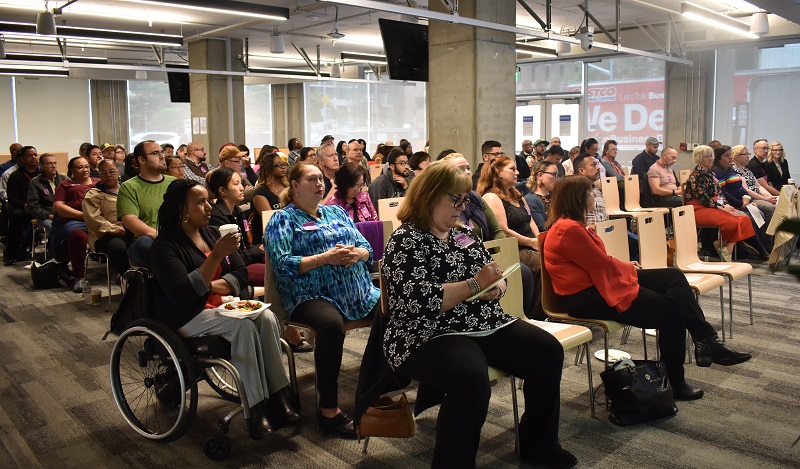IPS: A Proven Solution for Employment in the Fight against Homelessness
By Beth Stokes
Executive Director, Episcopal Community Services

Individual Placement and Support (IPS) is an evidence-based practice designed primarily to help people with behavioral health conditions work at regular jobs of their choosing. The model has also evolved to serve others, including transition‐aged youth, veterans, justice‐involved individuals, people receiving public benefits, and, significantly, people experiencing homelessness.
In June, Episcopal Community Services was proud to host a packed discussion on IPS at Google’s office in San Francisco, where nationally recognized experts Rick DeGette and Emery Cowan shared lessons on the process of integrating employment support into homeless systems of care. Speaking to a crowd of homeless service providers from ECS, the City of San Francisco, and other organizations, they reviewed the basic principles of implementing IPS, how those principles have been applied successfully in other counties, states, and organizations, and how this process might be applied for San Francisco’s homeless population.


As Rick and Emery explained, studies have shown that in general, 80 percent of people who are homeless want to work. In California, 60-70 percent of those with serious mental illness want jobs, but 90 percent of people who receive public mental health benefits are unemployed. And, as Emery noted, unemployment only exacerbates mental health issues. “We all want to feel like we’re contributing,” she said.
Yet, as crucial as rapid employment is to recovering from homelessness, if people are placed in jobs where they don’t feel comfortable and engaged, they may often lose or leave those jobs quickly. As Rick stressed, “Job matching is everything.”
This learning event was the first step in ECS’s plan to incorporate employment placement into our service model. Already, we have our CHEFS culinary training program, and more recently we launched a partnership with Goodwill for job placement services for individuals who are interviewed in Coordinated Entry. In the following months, we will continue to incorporate IPS principles and activities into all areas of our programming.
So, how do we effectively match individuals facing homelessness and other challenges with the right jobs? The IPS model of practice is designed to do that using eight principles:
8 Principles of Individual Placement and Support
- Competitive Employment: Agencies providing IPS services are committed to competitive employment as an attainable goal for people with behavioral health conditions seeking employment. Mainstream education and specialized training may enhance career paths.
- Eligibility Based on Client Choice: People are not excluded on the basis of readiness, diagnoses, symptoms, substance use history, psychiatric hospitalizations, homelessness, level of disability, or legal system involvement.
- Integration of Rehabilitation and Mental Health Services: IPS programs are closely integrated with mental health treatment teams.
- Attention to Worker Preferences: Services are based on each person’s preferences and choices, rather than providers’ judgments.
- Personalized Benefits Counseling: Employment specialists help people obtain personalized, understandable, and accurate information about their Social Security, Medicaid, and other government entitlements.
- Rapid Job Search: IPS programs use a rapid job search approach to help job seekers obtain jobs directly, rather than providing lengthy pre-employment assessment, training, and counseling. If further education is part of their plan, IPS specialists assist in these activities as needed.
- Systematic Job Development: Employment specialists systematically visit employers, who are selected based on job seeker preferences, to learn about their business needs and hiring preferences.
- Time-Unlimited and Individualized Support: Job supports are individualized and continue for as long as each worker wants and needs the support.
IPS has been shown to significantly increase employment rates in countries around the world, as you can see in the chart from Emery and Rick’s presentation below.
We hope this is the first conversation of many as ECS reaches out to our partners to integrate the highly successful model of IPS into our comprehensive system of care. As the lead agency overseeing coordinated entry into homeless services in San Francisco, our approach must continually evolve and adopt best practices like these.
